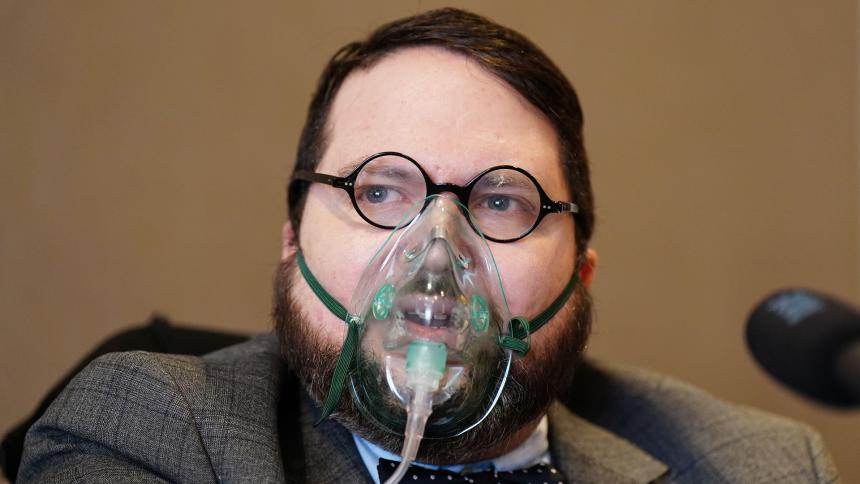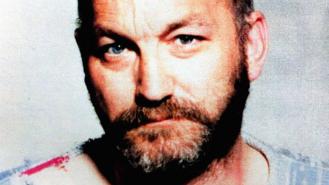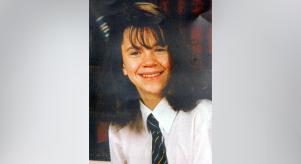
Nicholas Rossi: The sex offender who faked his death
On 29th February 2020, an obituary appeared online for a man named Nicholas Alahverdian, which read in part:
‘Nicholas Alahverdian, a Harvard graduate who grew up in foster care and became a vocal critic of Rhode Island’s childcare system, has died of non-Hodgkin Lymphoma. Alahverdian was 32 years old. His life, tragically cut short by cancer, was defined by the sexual abuse he suffered as a child. However, Alahverdian did not let the trauma define him, campaigning tirelessly for reform. He lived a warrior’s life. A fighter in spirit, but a peacemaker in practice.’
Growing up in Rhode Island, Alahverdian’s family was unable to provide adequate care, leading him into the state's custody. Alahverdian asserted that his parents were both abusive and struggled with alcoholism. In 2011, he publicly claimed that he was the victim of abuse while in the care of the Rhode Island Department of Children, Youth and Families, and spoke out against them during a news conference at the State House. He stated: ‘I was subjected to torture, beatings, assault in various forms. I refused to contact anybody, anybody at all.’
According to Alahverdian, the abuse and neglect persisted until his release in 2005. He alleged that he was subsequently transferred to a facility in Florida, where the mistreatment persisted. He expressed: ‘They cut staff, they fill up the beds to population and then some, they cut services and then they reaped in the profits.’ Alahverdian said that his experience caused him depression and post-traumatic stress disorder.
Alahverdian's statements were deeply troubling, but the state authorities were unable to find any records of abuse in his file. They urged him to provide evidence so that a thorough investigation could take place. However, Alahverdian did not present any evidence and ultimately dropped his lawsuit against the Rhode Island Department of Children, Youth and Families (DCYF) after the state waived his medical expenses, which amounted to approximately $200,000.
At the time of the obituary, Nicholas Alahverdian was wanted in connection with several sex offenses dating back to 2008. According to a student at Sinclair Community College in Dayton, Ohio, she encountered Alahverdian in January 2008 when he offered to accompany her to her next class. However, once they entered a basement stairwell, Alahverdian assaulted her, pinning her against a wall. The woman immediately reported the incident to the police.
Later that year, Alahverdian was found guilty of misdemeanor sexual imposition and public indecency after a bench trial. The judge ordered him to undergo community service and counselling and to register as a Tier I sex offender. Alahverdian promptly appealed the conviction, resulting in a stay of his sentence, and he relocated to Massachusetts.
In October of the same year, the court determined that Alahverdian had exhausted all his appeals and summoned him for a hearing to reinstate his sentence. However, he failed to appear, leading to the issuance of a bench warrant for his arrest. On 9th November, Alahverdian was apprehended by Harvard University police in Boston and subsequently returned to Ohio, where his original sentence was imposed. It didn't take long before Alahverdian found himself in legal trouble once again.
In November 2010, police received a call from a woman who directed them to Nicholas Alahverdian's apartment in Rhode Island after hearing a disturbance. Upon arrival, the officers heard a man and woman screaming. When they knocked on the front door, the woman revealed that Alahverdian had slapped her and knocked her down when she attempted to leave. It was discovered that the woman had only met Alahverdian that day after chatting online. Alahverdian pleaded no contest to domestic simple assault in relation to the incident.
A few weeks later, another woman walked into the Pawtucket police station and expressed her desire to report an incident without pressing charges. She explained that she had gone to dinner with Alahverdian the previous night and returned to his apartment, where he forcefully attempted to engage in sexual activity. When she refused, he became enraged and prevented her from leaving. He later drove her to an ATM and demanded that she withdraw $200 to cover the expenses of their date.
In May 2011, Alahverdian's wife, who had been married to him for six months, reported to the police that she was in the process of divorcing him and had an active restraining order against him. Despite the restraining order, she claimed he persistently harassed her. Although the police stated they could issue an arrest warrant, Alahverdian was not immediately arrested.
Two years later, he attempted to sue Sinclair Community College and Dayton Municipal Court because he claimed they made ‘serious, life-altering false allegations’, but the lawsuit was dismissed. Two years later, Alahverdian married for a second time, but the marriage was short-lived. His wife filed for divorce and the courts ruled that he was ‘guilty of gross neglect of duty and extreme cruelty’.
In 2018, investigators began looking into untested sexual assault kits and from one in Utah in 2008, the DNA came back as a match from Alahverdian, but detectives couldn’t find him.
The timing of his death appeared to be convenient and caught the attention of detectives who soon learned that Alahverdian was also in financial difficulty and being investigated by the FBI. According to Sharon Lane, his former foster mother in Ohio, he had fraudulently obtained 22 credit cards and loans under her husband’s name and had racked up debts totally almost $200,000. He also owed his second wife $52,000 from a loan.
Shortly before his reported death, Alahverdian became aware of the FBI investigation and began claiming to various individuals that he was in different locations, including Ireland and Canada. He started posting on social media that he had been diagnosed with non-Hodgkin lymphoma, and soon after, an obituary for him appeared online.
Detectives suspected that Alahverdian had staged his own death, leading to the issuance of a sealed arrest warrant in September of that year. During their investigation into his background, they discovered other crimes attributed to him, including a 2008 rape committed in Orem, Utah. Two years after his reported death, the Salt Lake County District Attorney's Office filed charges against him for first-degree sexual assault. Alahverdian's biological mother claimed that the writing style in the obituary matched his.
On 13th December 2021, he was tracked down at Queen Elizabeth University Hospital in Glasgow where he was suffering from COVID. He claimed that it was a case of mistaken identity and that he was, in fact, an Irish orphan. However, fingerprinting showed that he was Nicholas Alahverdian. Efforts are currently underway to have him extradited.
Where is he now?
Fast-forward four years and here’s where the saga has landed: in a US courtroom, with two rape convictions and back-to-back prison terms.
From 'Arthur Knight' to a seat in the dock
After a two-year identity charade in Scotland where he claimed to be an Irish orphan named Arthur Knight (despite fingerprints, tattoos and even voice analysis saying otherwise), the Scottish courts ruled there was no barrier to sending him back to the US. Scottish ministers approved the order in October 2023. He was extradited in January 2024. First stop? Utah. To face charges tied to 2008 attacks.
Trial one: Salt Lake County (August 2025)
The first Utah case to reach a jury involved a former girlfriend who met Nicholas Alahverdian (also known as Nicholas Rossi) in 2008. A decade-old rape kit, tested during Utah’s backlog clear-up, had pointed investigators to him in 2018.
In August 2025 a jury found him guilty of rape. Judge Barry G. Lawrence handed down Utah’s indeterminate sentence of five years to life. This means the Board of Pardons and Parole will one day decide how long he'll spend in practice. Rossi maintained his innocence but was unable to convince the jury.
Trial two: Utah County (September–November 2025)
A second jury in Provo convicted him in late September 2025 of raping another woman in 2008. Judge Derek Pullan handed down a second indeterminate term of five years to life. Crucially, he ordered it to run consecutively, not alongside, the first. He now faces a minimum of 10 years before parole is even on the table, with the possibility of much longer. Rossi told the court (again) that the women were lying.
Why the sentences read like that
Utah uses indeterminate sentencing for first-degree felonies like rape. Judges set the statutory range and then the Board of Pardons and Parole decides the actual time served after reviewing behaviour, risk and victim input.
Consecutive terms stack the minimums (in Rossi’s case at least 10 years) but the ceiling is still life. It’s less dramatic than a big headline number, but it gives parole authorities a wide lane to account for pattern and risk.
The DNA thread that finally unspooled him
Both Utah cases trace back to the 2018 testing of old sexual-assault kits, which matched the DNA of Rossi/Alahverdian. That match breathed new life into stalled cases and prompted investigators in other states to revisit his trail of aliases and assaults. It’s a grim but telling example of the importance of rape-kits and why reviewing backlogs matters, even years later. Without that lab work, the 'Arthur Knight' performance in Scotland might have bought him far more time.
What about the other jurisdictions?
Utah now has him in state custody, but the Beehive State isn’t the only place he has a reputation. Past offences in Ohio (including alleged fraud) and Rhode Island (failure to register as a sex offender) have been flagged. Whether they follow up will depend on how long he actually serves and what prosecutors decide is worth pursuing after two rape convictions. For now, the focus is squarely on the Utah sentences.
The Scottish coda
It’s worth taking a moment to tip our hats to our pals up in Scotland. Hospital staff in Glasgow clocked the distinct tattoos and recognised his mugshot from an Interpol wanted notice. Without them, Rossi could still be sheltering up north.
Police Scotland made the arrest in December 2021 and over the next few years sifted through a pile of outlandish claims (at one point, he said fingerprint evidence was planted while he was in a coma). The High Court of Justiciary ultimately backed extradition and put an end to his delay tactics. Ultimately, this is what helped fast-track Rossi's transatlantic flight and get him back to the US to face the consequences of his crimes.
What happens next?
The update in one breath: extradited in January 2024, convicted of two 2008 rapes in August and September 2025, sentenced in October and November to consecutive indeterminate terms of five-to-life. Basically, a combined minimum of 10 years before parole review, and potentially much longer. Whatever he calls himself, the courts have called time on the Irish orphan charade.
Rossi (whose legal name in US filings remains Nicholas Alahverdian) has already announced plans to appeal both convictions. Meanwhile, he appears to be upholding the identity theatrics that defined his Scottish chapter. Reporters note he’s asked jailers and courts to use the Arthur Knight moniker. Judges responded with a firm no.








